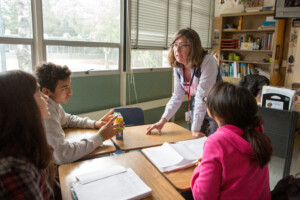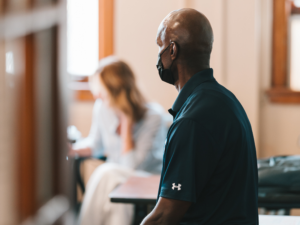States Adding Mandatory Cert for Teaching Online
 EdWeek reports that States Eye Standards for Virtual Educators with a byline suggesting “experts say many states and national education groups are behind the curve in addressing the issue of teacher quality for the online classroom.” More specifically, the piece by Ian Quillen and Michelle R. Davis suggests that states are rushing to manage a set of inputs they don’t understand with the historical monopoly tool of certification. It’s clear most of these hurdles will not add quality (just guaranteed work and revenue for state offices and colleges). Here’s the full story. Let me know if you think certification for online instruction can add value.
EdWeek reports that States Eye Standards for Virtual Educators with a byline suggesting “experts say many states and national education groups are behind the curve in addressing the issue of teacher quality for the online classroom.” More specifically, the piece by Ian Quillen and Michelle R. Davis suggests that states are rushing to manage a set of inputs they don’t understand with the historical monopoly tool of certification. It’s clear most of these hurdles will not add quality (just guaranteed work and revenue for state offices and colleges). Here’s the full story. Let me know if you think certification for online instruction can add value.
In Idaho, the state is moving toward a mandate that online teachers have additional training to teach in a solely virtual environment. Most online teachers in Georgia must pass a professional-development course in virtual instruction. And many virtual schools in other parts of the country require that their cyber educators complete professional development aimed specifically at teaching in an online environment.
Yet many states and education groups still have not addressed the issue of teacher quality for the online classroom. And dissenters say added requirements for cyber educators could exacerbate existing teacher shortages, and even be detrimental to teacher quality.
Those supporting additional certification see it differently. They say the goal is to make sure students aren’t getting shortchanged.
“We can put any warm body on the other end of the computer, but are those kids going to learn?” said Christina Linder, the director of certification and professional standards at the Idaho Department of Education. “Based on what we know, no.”
“It’s another hoop to jump through,” she said of additional certification, “but it’s the right hoop.”
Idaho is in the process of adopting recommended state standards for online teachers, with the intent of eventually making them mandatory, Ms. Linder said.
Many states require a virtual instructor to be a state-certified teacher, but a majority of states have no endorsement to label an instructor competent in the skills necessary to work in a fully virtual environment. Those that do, or are considering the step, often bill the endorsements as a desirable portfolio-builder rather than a required credential.
“The fact that [schools] can hire people that have these kinds of endorsements can definitely give [teachers] more marketability,”said Christina Clayton, the director of virtual learning at the Georgia Virtual School, or GVS, a state-run school that instructs about 30,000 students a year. “I think it’s going to become the norm rather than a requirement.”
While most states don’t require a separate credential for online teachers, virtual schools often make professional development focusing on online teaching mandatory.
Incoming teachers at GVS must now take and pass a yearlong course in online instruction that includes completion of a virtual field experience. Other virtual schools have similar programs, but with GVS being run by the state department of education, its certificate doubles as a state-issued endorsement. There are plans for future work with universities in the Georgia system to offer the online-teacher training and certification in graduate programs.
Texas has a similar program. Any courses being used in the Texas Virtual School Network, created in January 2009, must employ only teachers who are Texas-certified and have completed an online professional-development program accepted by the network, said Barbara B. Smith, the network’s project director.
The Richardson, Texas-based network acts as a clearinghouse to vet online courses. As of August, 345 school districts had registered to allow their students to take courses approved by the network.
Idaho is in the process of final work on a two-tiered certification: one for instructors who teach “blended” face-to-face and online classes that every Idaho preservice teacher would earn, and one for fully online instructors, to be earned by in-service teachers.
While the certification for new virtual teachers would initially be recommended, the intent is to make it a requirement. Idaho officials estimate it would take until 2015 to fully implement the endorsements. Already-working online instructors would continue to teach, thanks to a grandfather clause, and not be forced back to school.
“We’re kind of in the limbo phase of transitioning,” said Lisa Dawley, the chair of Boise State University’s department of educational technology and one of the people leading the creation of the Idaho virtual-teaching-certification standards.”[People are saying] ‘let’s build some basic competencies.’ And that makes sense right now. We still have 90 percent of teachers teaching in traditional brick-and-mortar schools.”
Louisiana also offers an online-teaching endorsement, which permits instructors to use previous online-teaching experience to meet its requirements. Utah offers a distance-learning endorsement, but it would have to be adapted to include online-only instruction. In its current form, it refers mainly to synchronous distance-learning formats, such as videoconferencing, with non-Web-based technology.
With many teachers already instructing in online environments, policies are lagging behind, said Cathy Cavanaugh, an associate professor of educational technology at the University of Florida, in Gainesville. “We are playing catch-up,” she said. “Practice is moving beyond policy rapidly.”
States considering online-teacher endorsements often use as a reference suggested recommendations released by such organizations as the International Association for K-12 Online Learning, or iNACOL, and the Southern Regional Education Board, or SREB. Without a state mandate, virtual schools often use those same guidelines when hiring and training teachers.
Myk Garn, the director of educational technology for the SREB, said the hope once was that his organization’s standards would spark the creation of more certifications across the 16 SREB member states. But state-imposed financial and enrollment caps, he said, have limited momentum toward creating virtual-teaching endorsements.
“The assumption . . . was that student demand was going to drive this,” Mr. Garn said. “One component of that is that most of our state virtual schools are capped. They have a finite amount of funding. Many of them are at the capacity of their funding, so they also have the teachers they need right now.”
Instead, schools like the state-run Virtual Virginia high school must screen instructors themselves, through a process that involves both extensive interviews and hands-on training.
Lan Neugent, Virginia’s assistant superintendent for technology, said the creation of state certification for online learning in Virginia is not only unlikely, but undesirable.
Because Virginia offers alternative-certification pathways to teachers who did not get a bachelor’s degree in education, Mr. Neugent said, the concern is that those certification recipients could then acquire an online endorsement and enter virtual instruction without enough of a pedagogical foundation.
To avoid that scenario, Virtual Virginia hires only teachers with previous brick-and-mortar classroom experience, according to its website. But Mr. Neugent admits the process isn’t foolproof.
“We have great concern about people who just interview well and seem to understand what to do and the rest of it, but don’t have any formalized training” in virtual instruction, Mr. Neugent said.
Ann Flynn, the director of education technology for the Alexandria, Va.-based National School Boards Association, said she supports a recommendation for additional professional development and skills for virtual teachers. But she also stressed that the idea of making that mandatory raises red flags.
“Some states are already challenged to get high-quality teachers and get a good, solid teaching force,” she said. “You don’t want to see criteria set up that present unnecessary obstacles.”
Others say research shows that the true test of how well teachers will do in an online environment is still largely their effectiveness in a traditional classroom. Requiring new certifications for online teachers could discourage talented face-to-face teachers from entering that realm.
“There might be some exceptional teachers now that have been practicing before these certifications have been established,” said Barbara Treacy, a managing project director for the Center for Online Professional Education at the Newton, Mass.-based Education Development Center. “We don’t want to use [certification] as a weapon against teachers who are practicing and maybe are even leaders in the field.”








Bob Fiesthumel
We feel our asynchronous video application goes a long way in filling an important interactive gap in distance learning. Oral communication skills are becoming more and more important in this service focused society. Now distance learning can focus on helping students improve oral communicaton skills with the use of YouSeeU. If interested take a look. www.youseeu.com
Lisa Dawley
Tom, thank you for your thoughtful piece on online teacher certification. In the case of Idaho, we've been working as a team with the state, online schools, and universities for over three years to have our online teaching standards approved (last spring), and the endorsement (this coming spring). It's been a long, laborious process, not rushed at all, based on research and trying to reach consensus among involved players. I'm proud of the way our process has played out in Idaho.
I think standards and certifications are critical for teachers in any area of specialization, including online teaching. We know from our four year research agenda, "Going Virtual!," that while many of the larger virtual school programs have highly evolved professional development programs, such as Connections Academy and Florida Virtual School, many other online teachers across the country aren't prepared to work with kids in a virtual or blended learning environment. Some never receive any training. This year’s survey showed us that 25% of brand new online teachers reported they received no training as new teachers on the job. This percent drops to 12% by year 3. I wouldn't want my child to be the guinea pig in an online classroom with a teacher who has no training, would you? So what is the accountability process if not certification and/or endorsement? Or if the certification process is opened to schools (and I'm ok with that), I'm assuming they'll be held to the same level of accreditation standards that we must maintain with the U.S. Dept of Education, our State Dept. of Education, and NCATE? And if not, why not?
While COEs are becoming the ugly step-child of education, the part of my job that feels the most laborious, at times, is dealing with accreditation at the state, national, and professional levels. Everyone wants schools to be accountable, yet that process does slow things down, both in universities and in public schools. There is a fine tension between too much accountability, and leaving room for innovation and a responsive educational experience. While the federal government’s response has been more testing and accountability to the situation, I feel this response has only aggravated our educational system, frustrated teachers and kids, and created a nation of really good test-takers.
While many are ready to throw out Colleges of Education and replace them with schools that have corporate interests, I'm an advocate of working together to leverage the best of all involved parties to make education happen effectively and efficiently. If they are wiling to evolve, COEs can play a wonderful role in providing foundational knowledge in areas such as cyberlearning, cyberpsychology, action research (studying and improving your own teaching), and all that that entails. K-12 schools do a wonderful job of providing a contextualized teacher education that is pragmatic and applicable to a particular school environment. Why not leverage both opportunities during a teacher's education? For example, why waste K-12 school tax dollars training online teachers about cyberpsychology issues such as bullying, flaming, and griefing, when those might be covered during sophmore year at the university? And why have the university try to teach methods when those may be best learned in the school setting?
Susan Patrick and I recently contributed to a national report called "Redefining Teacher Education for Digital Age Learners," available at http://www.redefineteachered.org. I would encourage your readers to review the report, and understand the new directions for teacher education that are being advocated by representatives of this report, including iNACOL, NCATE, ATE, ISTE, and SETDA, among others. Learning teams that incorporate expertise from schools, university, industry, parents, business, students, and others are the wave of the future. Social media and networking technologies can help us achieve this goal.
I am an advocate for change, especially in Colleges of Education, as well as in the current accreditation and accountability processes that bog down the entire system. But COEs do have a very critical role to play in the research of emerging practice and technologies, and assisting others in questioning and evaluating their own practice. Rather than frame COEs as the black sheep in order to shift toward models that appear to be supported by corporate interests, how can we all learn to show respect for each other’s areas of specialties, and leverage those specializations in the best interest of kids? I’m a COE faculty member and have been teaching online for over 15 years. I think I still have something valuable to contribute to the conversation. Thanks for listening.
Lisa